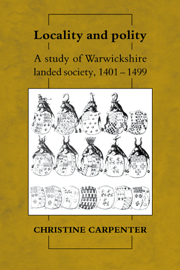Book contents
- Frontmatter
- Contents
- List of figures and tables
- Preface
- List of abbreviations
- Note on text
- 1 Introduction
- PART I STRUCTURAL
- PART II CHRONOLOGICAL
- 9 Social and political networks 1401–50
- 10 Warwickshire under Richard Beauchamp: 1401–39
- 11 The interregnum: 1439–49
- 12 The period of crisis I: Warwickshire under the Kingmaker: 1449–61
- 13 The period of crisis II: Warwickshire under the Kingmaker and the duke of Clarence: 1461–78
- 14 The period of crisis III: Warwickshire under the crown: 1478–85
- 15 The period of crisis IV: Warwickshire under the crown: 1485–99
- 16 Politics and society c. 1449–1500
- 17 Conclusions
- Appendices
- Bibliography
- Index
17 - Conclusions
Published online by Cambridge University Press: 27 October 2009
- Frontmatter
- Contents
- List of figures and tables
- Preface
- List of abbreviations
- Note on text
- 1 Introduction
- PART I STRUCTURAL
- PART II CHRONOLOGICAL
- 9 Social and political networks 1401–50
- 10 Warwickshire under Richard Beauchamp: 1401–39
- 11 The interregnum: 1439–49
- 12 The period of crisis I: Warwickshire under the Kingmaker: 1449–61
- 13 The period of crisis II: Warwickshire under the Kingmaker and the duke of Clarence: 1461–78
- 14 The period of crisis III: Warwickshire under the crown: 1478–85
- 15 The period of crisis IV: Warwickshire under the crown: 1485–99
- 16 Politics and society c. 1449–1500
- 17 Conclusions
- Appendices
- Bibliography
- Index
Summary
In bringing into focus the main themes of this study, we shall attempt to answer some of the principal questions that have been asked along the way. The logical starting point is the nature of a gentry society in the fifteenth century. It seems clear that we must include in it all landowners with pretensions to gentility, however insignificant they might appear. Although there was an undeniable hierarchy among the gentry, the fact that local studies have tended to concentrate on the county elite has exaggerated the distance between these and the lesser local figures. Landowning society had several levels, each one acting as a connecting link between those above and below it. As ever, misunderstanding comes from the two-dimensional view: failing to appreciate that local leaders looked downwards for political support as well as upwards to the world of lord and king for protection. Although it was always the great who represented the shire in parliament, they were nominally the representatives of all its inhabitants, and, if they took notice of their own interests alone, they would be in trouble from men who, even if at a lower level, shared in their power and in their way of life.
All the gentry were differentiated from those below them by their life-style and aspirations and above all by the fact of their lordship over men or, in the case of professionals without manorial lordship, their participation in the world of lordship. However limited their horizons, their access to political society brought them into a wider world than that of their inferiors.
- Type
- Chapter
- Information
- Locality and PolityA Study of Warwickshire Landed Society, 1401–1499, pp. 615 - 644Publisher: Cambridge University PressPrint publication year: 1992



